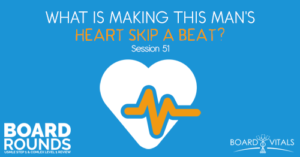
As always, we’re joined by Dr. Mike Natter from BoardVitals. If you are looking for some more help with your board prep, check out everything they have to offer. Their massive QBank database will help you prepare for Step 1 or Level 1, and even in the future as well for your Shelf exams. Use the promo code BOARDROUNDS to save 15% off.
Also, check out all our podcasts for more medical school application resources on Meded Media. Finally, be sure to follow us on Instagram @mike.natter and @medicalschoolhq.
Listen to this podcast episode with the player above, or keep reading for the highlights and takeaway points.
A 36-year-old male presents to the hospital because he fears his heart may be “skipping a beat.” He denies any palpitations but is convinced his heartbeat is abnormal. The patient’s EKG 24-hour telemetry and echocardiogram indicate normal results. The patient remains convinced that he has a life-threatening arrhythmia despite a normal workup and other normal evaluation from a neighboring hospital six months ago. He checks his pulse countless times a day to see if his rhythm is irregular.
Psychiatry is counseled that after the patient has an outburst at the medical team demanding more tests, he is currently working part time until he “gets to the bottom of this.” He admits to exaggerating symptoms, but remains confident about having an arrhythmia. What is the most likely diagnosis?
(A) somatic symptom disorder
(B) pain disorder
(C) conversion disorder
(D) illness anxiety disorder, formerly known as hypochondriasis
A medically related issue here. This is really nothing physical. There’s nothing testing-wise that shows anything other than the patient’s claim.
So the correct answer here is (D) illness anxiety disorder.
This is a gentleman who believes there is something wrong. He has affirmed fixed false belief. Test results show nothing. There’s no objective data to suggest anything’s wrong, but he is still firmly in fixed belief that there is something going on even though it’s false. This actually is a kind of a mental disorder.
Conversion disorder is a mental condition. It’s where the patient can be blind or paralyzed or other kinds of neurologic symptoms that can’t be explained by medical evaluation. They believe they can’t move their leg or they feel that they can’t see when there’s really nothing wrong. They actually can but they just think they can’t.
Somatic symptom disorder is more of a somatic complaint. They’re nauseous and their belly hurts all the time but there is no medical reason for it. It’s kind of the anxiety manifesting as nausea, vomiting or headaches or whatever that may be.
It’s not a pain disorder either because the patient is not complaining of any pain.
Just reassuring them is really the best way to approach these patients because that’s what they need. Oftentimes, there’ll be answer choices for how you would approach these patients. And if there’s ever an answer choice in these types of questions that says something along the lines of frequent visits to your office in a week or two weeks. Those are usually the right answers in these cases because they just need this. They have to feel as though you’re on their side.
“The worst thing you can do is confront them and tell them that they're wrong and they're lying and all these things and you don't believe them.”Click To TweetFollow us on Instagram @mike.natter and @medicalschoolhq

Lorem ipsum dolor sit amet, consectetur adipiscing elit
I just received my admission to XXXXX! This is unreal and almost feels like I am dreaming. I want to thank you for all of your help with my application. I cannot overstate how influential your guidance and insight have been with this result and I am eternally grateful for your support!
IM SO HAPPY!!!! THANK YOU SO MUCH FOR ALL YOUR HELP, IM INDEBTED TO YOU! Truly, thank you so much for all your help. Thank you doesnt do enough.
I want to take a few moments and thank you for all of your very instructive, kind and consistent feedback and support through my applications and it is your wishes, feedback, and most importantly your blessings that have landed me the acceptance!
I got into XXXXX this morning!!!! It still has not hit me that I will be a doctor now!! Thank you for all your help, your words and motivation have brought me to this point.
I wanted to once again express my heartfelt gratitude for your help in providing feedback during my secondary applications. Your guidance has been instrumental in my journey.
Just wanted to share my wonderful news! I received my first medical school acceptance! Thank you for all that you do for us Application Academy!!!
I am excited to tell you that I just got my third interview invite from XXXXX today! I can’t believe it. I didn’t even know if I was good enough to get one, let alone three – by mid-September. Thank you so much for all of your help and support up to this point; I would not be in this position without it!!
I wanted to thank you for helping me prepare for my XXXXX interview. Even in a 30-minute advising session, I learned so much from you. Thank you for believing in me, and here’s to another potential success story from one of your advisees!
I just received an acceptance with XXXXX! This is so exciting and such a huge relief and so nice to have one of our top choice schools! I also received an interview with XXXXX which brings the total up to 20 interviews! Thank so much, none of this would have been possible without you!